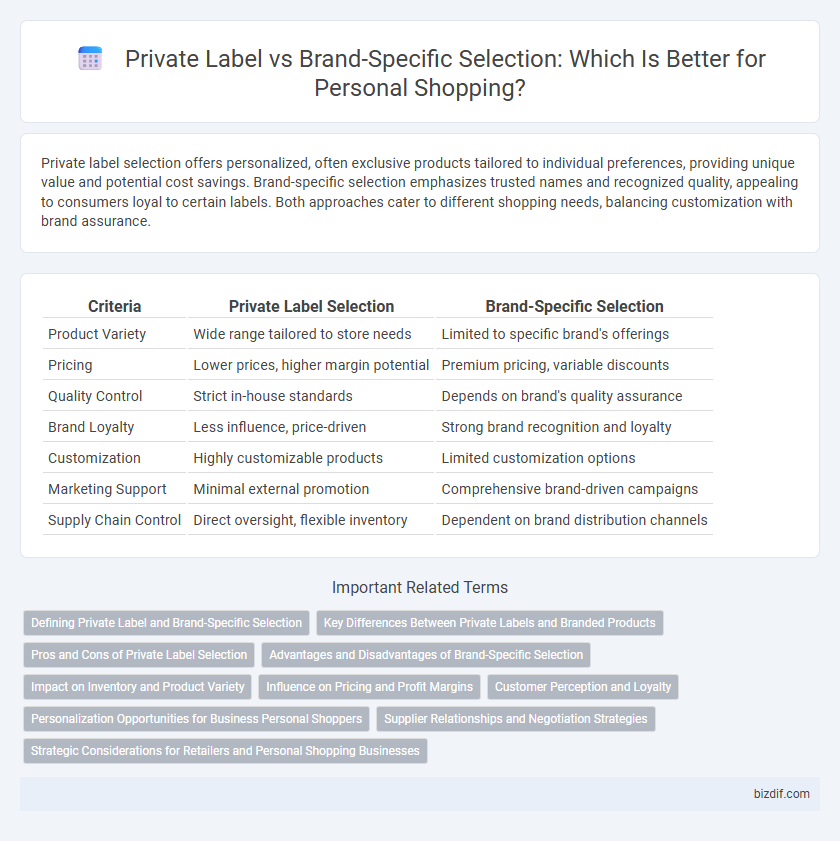Private label selection offers personalized, often exclusive products tailored to individual preferences, providing unique value and potential cost savings. Brand-specific selection emphasizes trusted names and recognized quality, appealing to consumers loyal to certain labels. Both approaches cater to different shopping needs, balancing customization with brand assurance.
Table of Comparison
| Criteria | Private Label Selection | Brand-Specific Selection |
|---|---|---|
| Product Variety | Wide range tailored to store needs | Limited to specific brand's offerings |
| Pricing | Lower prices, higher margin potential | Premium pricing, variable discounts |
| Quality Control | Strict in-house standards | Depends on brand's quality assurance |
| Brand Loyalty | Less influence, price-driven | Strong brand recognition and loyalty |
| Customization | Highly customizable products | Limited customization options |
| Marketing Support | Minimal external promotion | Comprehensive brand-driven campaigns |
| Supply Chain Control | Direct oversight, flexible inventory | Dependent on brand distribution channels |
Defining Private Label and Brand-Specific Selection
Private label selection involves choosing products created and sold under a retailer's own brand, often offering unique items that differentiate from competitors with controlled quality and pricing. Brand-specific selection centers on sourcing items exclusively from well-known established brands, leveraging their reputation and consumer trust to drive sales. Understanding the distinction between private label strategies and brand-centric approaches is essential for personal shoppers aiming to tailor product choices to client preferences and market demands.
Key Differences Between Private Labels and Branded Products
Private label selection offers unique products tailored to specific retailers, often at lower prices due to reduced marketing costs, while brand-specific selection features well-known brands with established reputations and higher consumer trust. Private labels provide retailers greater control over product quality and inventory, whereas branded products rely on brand loyalty and consistent marketing efforts. The key differences lie in pricing strategies, consumer perception, and supply chain control, with private labels emphasizing exclusivity and cost-effectiveness, and branded products focusing on established recognition and brand equity.
Pros and Cons of Private Label Selection
Private label selection offers personalized, budget-friendly options that cater to specific customer preferences, often providing unique products not available through brand-specific selections. These items typically have higher profit margins for retailers but may lack the established reputation and perceived quality of well-known brands. However, private labels allow for greater control over product attributes, packaging, and marketing strategies, enabling tailored consumer experiences.
Advantages and Disadvantages of Brand-Specific Selection
Brand-specific selection guarantees product consistency and leverages established brand reputation, increasing customer trust and satisfaction. However, it often restricts variety and may come with higher costs due to brand premiums, limiting budget flexibility. Dependence on a single brand can also reduce negotiation power and adaptability in response to market trends or customer preferences.
Impact on Inventory and Product Variety
Private label selection streamlines inventory management by reducing SKU complexity and enabling better control over product quality and supply chain. Brand-specific selection often increases product variety but can complicate inventory tracking and require higher stock levels to meet diverse customer preferences. Optimizing the balance between private label and brand-specific products maximizes inventory efficiency and enhances customer satisfaction through targeted assortment.
Influence on Pricing and Profit Margins
Private label selection often leads to higher profit margins due to lower production costs and greater pricing control compared to brand-specific selection, which typically involves fixed wholesale prices and limited margin flexibility. Retailers leveraging private labels can set competitive prices while maintaining exclusivity, enhancing customer loyalty and profitability. Brand-specific products may attract loyal customers but usually result in thinner margins because of manufacturer pricing constraints and promotional expenses.
Customer Perception and Loyalty
Private label selection often enhances customer perception by offering exclusive products tailored to specific tastes, which can foster stronger loyalty through unique value propositions. Brand-specific selection leverages established brand reputation and trust, attracting customers who prioritize familiarity and consistent quality. Balancing private label and brand-specific options enables retailers to cater to diverse customer preferences, optimizing satisfaction and retention.
Personalization Opportunities for Business Personal Shoppers
Private label selection offers business personal shoppers greater control over product curation, enabling tailored recommendations that align closely with individual client preferences and budget constraints. Brand-specific selection leverages established reputations and consistent quality, facilitating confidence and trust in purchases while allowing personalization through exclusive brand collaborations and limited editions. Combining both strategies enhances personalization opportunities by balancing unique, customizable options with recognized brand value, ultimately driving higher client satisfaction and loyalty.
Supplier Relationships and Negotiation Strategies
Private label selection enables closer supplier relationships through direct negotiation, often securing exclusive terms and better margins compared to brand-specific selection, which relies heavily on established brand contracts and pricing structures. Negotiation strategies for private labels prioritize volume commitments and product customization to enhance supplier trust and cost advantages. In contrast, brand-specific selection focuses on leveraging brand reputation and pre-set pricing tiers, limiting flexibility in supplier negotiations.
Strategic Considerations for Retailers and Personal Shopping Businesses
Retailers and personal shopping businesses strategically weigh private label selection against brand-specific selection to optimize profit margins and customer loyalty. Private labels offer control over product design and pricing, enhancing differentiation and improving supply chain flexibility. Brand-specific selection leverages established brand equity and customer trust, driving immediate sales but limiting pricing and customization control.
Private label selection vs Brand-specific selection Infographic

 bizdif.com
bizdif.com